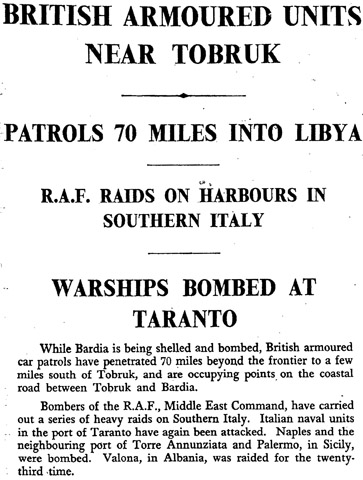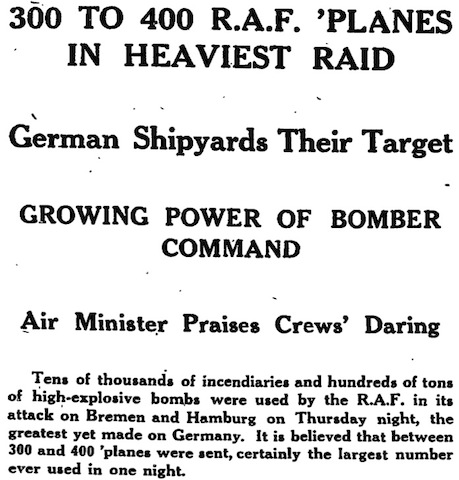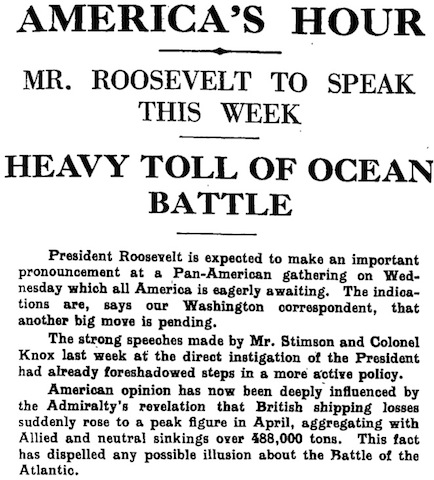
The remarkable flight to Scotland of Rudolf Hess still dominates the headlines today, though much more so in the Manchester Guardian (5) than in The Times, it must be said. More details are emerging. It now seems that Hess was trying to meet with one specific person, the Duke of Hamilton, whose seat is at Dungavel, just a few miles from where Hess landed by parachute.
The Duke is on active service, and was not at Dungavel on Saturday night. The Duke, who is the premier peer of Scotland, is 38, and succeeded to his title last year on the death of his father. He is best remembered for his boxing and flying achievements as Marquis of Douglas and Clydesdale, and he has met Hess through his sporting interests.
The line from Berlin, that Hess was on an unofficial peace mission, seems to support this:
He knew that Britain had made false statements not only about the military but also about economic conditions in Germany [says a semi-official German statement].
From his notes it is indisputably established that in his opinion the continuation of the war by Britain was entirely due to public opinion being misled by Churchill and his gang, who, he wrote, are alone responsible for preventing peace being established, which must mean terrible consequences for the people living on the island.
Hess apparently thought that Hamilton, who he had met at the 1936 Olympics and to whom he had recently sent a letter (passed on to the British government at the time), ‘had the necessary influence’ to persuade other Britons ‘of the insane attitude of her leaders’. Admittedly, the these letters may have been made up by Germany. But, says the Guardian‘s diplomatic correspondent,
if he fled from Germany in danger of his life he might, since he had to leave his wife and child behind, have attempted to provide evidence that he had gone with good intentions, believing that it would mitigate the consequences to his wife of his absence.
The Prime Minister’s statement, expected shortly, will ‘doubtless’ clear everything up. But the political correspondent says that ‘Hess has been talking freely’, although ‘it does not follow that the Government will tell the world what he has been saying’. While the ‘considerable elation’ at Hess’s flight is justified to the extent ‘that it reveals the first and probably not the last breach in Nazi unity at the top’, there is also the danger of ‘making Hess into a film hero or “glamour boy,” as I have heard it put’. Finally, an air correspondent notes that it is clear that Hess did not steal his Me 110 with the intention ‘to use it for raiding or for combat, for when used as a bomber it requires a bomb-aimer’:
Hess flew solo, and, moreover, the twin 20mm. shell guns and four machine-guns were all unloaded and the bomb racks were empty.
Just in case you were wondering.
It was ‘another quiet night’ for bombing last night:
The only reports of activity by the Luftwaffe over Britain last night were that enemy ‘planes were near two towns on the East Coast of Scotland. No incidents were reported. It was London’s fourth successive quiet night.
That doesn’t mean that civil defence workers can relax, of course. Ellen Wilkinson MP has been touring the country talking to fire-watchers: ‘We cannot let Britain burn down’, she told ‘a parade of women’s services’ (6) at Longford Park. She is helping her minister, Herbert Morrison, organise his ‘people’s fire army’, and trained women will play a large part in this thanks to the ‘calling up and compulsion’ of so many men:
“I believe we are going to find that among those women who were considered on the shelf we shall find a great reserve of just sheer toughness when it comes to keeping fit to fight Hitler.”
Gas is another danger which must be guarded against, although according to a special correspondent to the Guardian the public’s ‘lethargic mind has obviously not grasped the fact that a gas attack is possible and that if it comes there is danger for the unguarded’ (6).
Constant scoldings of those who do not carry their masks, vague threats of penalties if they continue the misdemeanour, references to the terrible effects of gas, melodramatic broadcasts from the inside of gas-vans, and bald statements that the gas masks gives perfect protection do not inspire people in the desired way.
To tackle this problem, an ‘”open” gas shed’ has been set up at Altrincham. This actually consists of two wooden sheds, placed at right angles, through which civilians can walk through while wearing their gas masks. As they pass through they are exposed to a ‘lachrymatory’ (or tear) gas, by they are only ‘mildly affected’ (out of seven thousand people who have passed through in total, only two were ‘excessively’ affected, while a third exhibited ‘mild hysteria’). It was found that only ten per cent had practiced wearing their masks before, sixty per cent ‘adjusted their masks, but failed to anti-dim them’, twenty-five per cent had ill-fitting masks, and another five per cent had faulty masks.
A lengthy report from Liverpool deals with how that city is coping with the aftermath of its heavy air raids:
What has happened at certain other heavily raided towns is now happening at Liverpool. Each evening, long before darkness falls, many people leave the city for what they consider the greater security of the countryside.
Liverpool’s authorities ‘in no way countenance or encourage these movements’, even though they are seen to be a somewhat ‘more healthy inversion of the older and somewhat wearying “trek” into the city to the nightly refuge of the big shelters. At the same time the shelters are being used for sleeping more than ever’ (that is to say, presumably, regardless of whether there is a raid alert on or not). As well, ‘normal evacuation — that is, of mothers and children, expectant mothers, the aged, &c.’ has removed a further ‘large percentage’ of ‘eligible evacuees’ from the city. Even so, Liverpool ‘is for the policy of “stay put” on Merseyside, where there is so much vital work to do”.
A leading article in the same paper (4) reflects an interesting light on this discussion of evacuation:
There is some slight satisfaction in knowing that our air attacks on Germany produce as great social dislocation as the German attacks on us. They have compelled large-scale evacuation of children from the German North and West to Czecho-Slovakia, to Poland, and to Austria.
German parents were apparently reluctant to send their children away, but then there was a great rush from the major British targets, even before ‘the last series of heavy British raids’. At the end of December 1940, for example, some 15,000 children from Berlin had been evacuated to the Polish Warthegau; by 20 February this figure had increased to 100,000.
The general inference is that German evacuation has been a hurried affair for which no adequate preparation had been made. It has now been extended on a huge scale […] it is a side of the war that must have had its effect on the confidence of the ordinary people.
I wonder if the author of the above would say the same of British evacuation?
This is enough for today, I feel, even though I haven’t dealt with the RAF in Iraq, the endgame in Abyssinia, the defence of Tobruk, the raid on Heligoland, or Henry Lloyd’s A Political and Military Rhapsody on the Invasion and Defence of Great Britain and Ireland (1779).
![]() This work is licensed under a Creative Commons Attribution-NonCommercial-NoDerivatives 4.0 International License.
Permissions beyond the scope of this license may be available at http://airminded.org/copyright/.
This work is licensed under a Creative Commons Attribution-NonCommercial-NoDerivatives 4.0 International License.
Permissions beyond the scope of this license may be available at http://airminded.org/copyright/.




